Contents
- Silent Burnout: The New Workaholism
- Lesson 1: Face The (Scary) Reality
- Lesson 2: Your Health is Not for Sale
- Lesson 3: Never Work for Matador Managers
- Office-Only Policies: Designed for Social Control
A silent burnout epidemic is coming. It will be fueled by toxic work cultures in tech masquerading as highly communicative communities focused on collaboration.
The office tells us to come back, because it’s human-led – but often it’s a place where social pressures drive folks to work themselves into oblivion.
Office culture is a thinly veiled lie.
Big tech is snatching away your freedom to work remotely like a jealous child snatches at another child’s birthday cake.
The big news this week was that Amazon CEO Andy Jassy has enforced an ‘office-only’ policy – which means no more hybrid and no more remote work for any of their 1.52 million employees from January 2025.
And he’s done it all to ‘strengthen our culture.’
Well, I was triggered.
Those of us who have been in tech for many years know what this really means for the people on the ground. Returning to the office for 5 days a week means a return to hustle culture.
A resurgence of longer working hours. A spike in intense job-related stress. And the erasure of work-life balance.
We’re told that this is the demanding nature of tech.
- And who are we to question it?
- In THIS global economy?
Tech giants are making a play for your freedom.
Bit by bit they’ve reclaimed control through fearmongering, layoff anxiety, pay cuts, and restructuring. They’ve made you work HARDER for LESS.
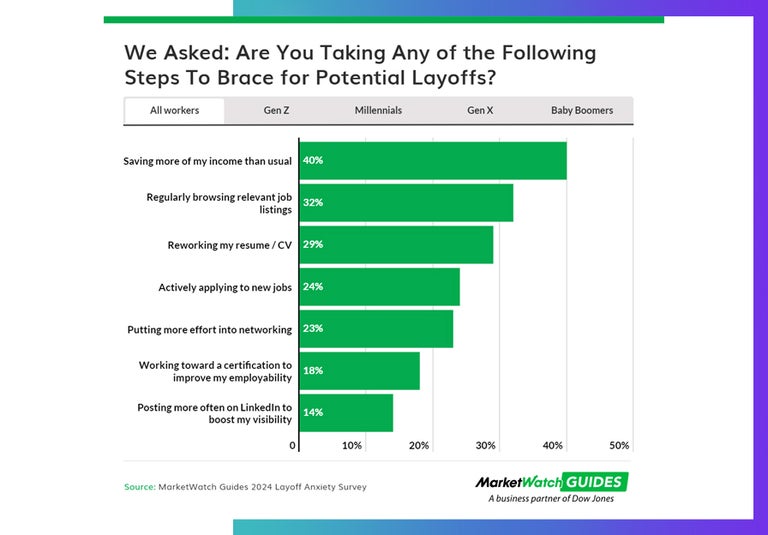
And now they’re insisting on a work-from-work return.
My prediction is that office-only policies in tech will usher in a new age of toxic workaholism. This flag is red for a reason.
So, in this article I’m going to offer you 3 lessons that I’ve learned about combating workaholism and burnout in my own career – as someone who has worked for global tech companies for 15 years.
Silent Burnout: The New Workaholism
A silent burnout epidemic is coming to steal your health and your future.
But how do you know if you’re vulnerable?
- Do you feel too pressured, busy or afraid to take leave? 46% of workaholics do.
- Do you skip lunch breaks? 45% of workaholics do.
- Do you prioritize work over your personal life? 54% of workaholics do.
- Do you worry about work even on your off day? 51% of workaholics do.
- Do you struggle to switch off during vacations? 50% of workaholics do.
- Do you feel anxious if you’re not kept in the loop? 45% of workaholics do.
- Are you told you work too much by family and friends? 44% of workaholics are.
- Do you check emails during the night? 48% of workaholics do.
- Are you the first to arrive and the last to leave work? 46% of workaholics are.
The main signs though – are your life, health and career progress decline.
And because this burnout is silent, you never, ever talk about it. It’s discouraged. In fact, you’re led to believe that it’s normal, because EVERYONE ELSE is going through it too.
It’s not normal!
Silent Burnout – or the new workaholism as I like to call it, refers to the gradual, unnoticed exhaustion that creeps in as tech workers continue to push themselves while actively suppressing outward signs of stress or burnout.
It’s characterized by quietly overworking while maintaining productivity, leading to long-term mental and physical health risks.
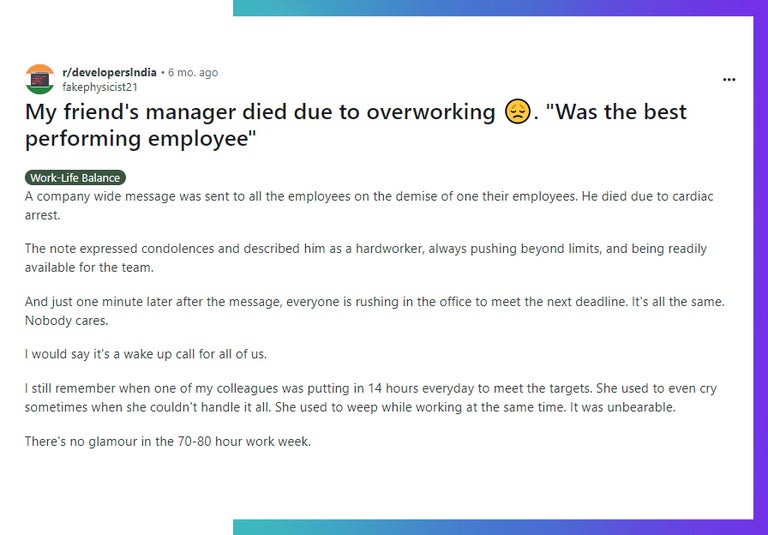
Here’s how to keep it from happening to you.
Lesson 1: Face The (Scary) Reality
The office is WORSE for work-life balance.
Not to be dramatic – but it’s hard to see office-only policies as anything but plainly illogical if you approach them from a work-life perspective.
Yet arguments persist that the office is just wonderful for socializing, connecting, collaborating and thriving emotionally, and (to be fair) it can be.
Some smaller office environments are great. But for most people, they’re just not.
That’s why:
- 4X as many applicants want remote jobs
- Fulltime in-office workers are the least satisfied (Forum Survey)
- Remote work makes people 20% happier than office work
Dr Gleb Tsipursky has written extensively about the misdirection that’s rife with the statistics shared about work-life balance and hybrid or remote environments.
They are compared to ideal states, and not to the real alternative (the office) which distorts the data.
Compared to a leisurely visit with friends, sure remote work is more isolating. But compared to the – often oppressive - office?
Not so much.
The nail in the ‘work-life balance’ coffin for me is the connection between workaholism and job retention. Unhappy, barely surviving, overworked people are always looking for a way out, a chance to leave.
Burnout isn’t sustainable – it triggers job searching.
The National Bureau of Economic Research found that hybrid workers – when compared to office workers – experience higher job satisfaction and retention – by 35%!
It’s better for people to work freely, away from the office.
Remote and hybrid work reduces burnout. That’s why pre-pandemic levels of burnout were that much higher than they are now.
But they’re rising again.
- Some 44% of global workers in 2022 have experienced workplace stress during their workday, repeating a record high from 2021 and extending a decade-long trend.

Is it just me or are tech CEO’s fast becoming supervillains?
As Elon Musk said in 2022, “We need to be extremely hardcore. This will mean working long hours at high intensity. Only exceptional performance will constitute a passing grade.”
Yikes.
Returning full-time to the office is going to result in harder work and burnout. And this isn’t culturally acceptable in tech. If you fall behind, you get left behind.
So, tell yourself the truth about what is happening, and don’t buy into flawed cultures. Spoken and documented culture is often radically different from the truth.
- How do you feel at work?
- How do your colleagues feel?
- Are they respecting your boundaries / needs?
- Do they listen to you as an individual?
If not, it’s time to go on the job hunt. Again.
Lesson 2: Your Health is Not for Sale
The office is WORSE for your health and wellbeing.
No job is worth your health.
If you don’t acknowledge that burnout is happening, it can (and does) kill you.
I got my personal wake-up call in my twenties, working 16-hour days – for years. Like many young tech workers, I bought into hustle culture and the deification of exhaustion.
It took me 6 months to recover from a life-changing illness.
I learned the most valuable lesson of my career.
Your health and wellness isn’t for sale – but that’s what you’re selling at cost, when you work yourself to exhaustion at the office.
Workaholism is the compulsion to overwork, driven by a need to stay ahead or prove your value, even at the expense of your health and personal life.
It’s a toxic, toxic cycle where long hours become the norm, leading to burnout, stress, and diminished productivity. At the end of burnout – is collapse.
- Six months into her job a young woman (26) died at Ernst & Young in India.
- A junior Bank of America banker (35) died after working 100 hours a week.
In Japan it happens so often there’s a term for it: karoshi, or ‘death by overwork.’
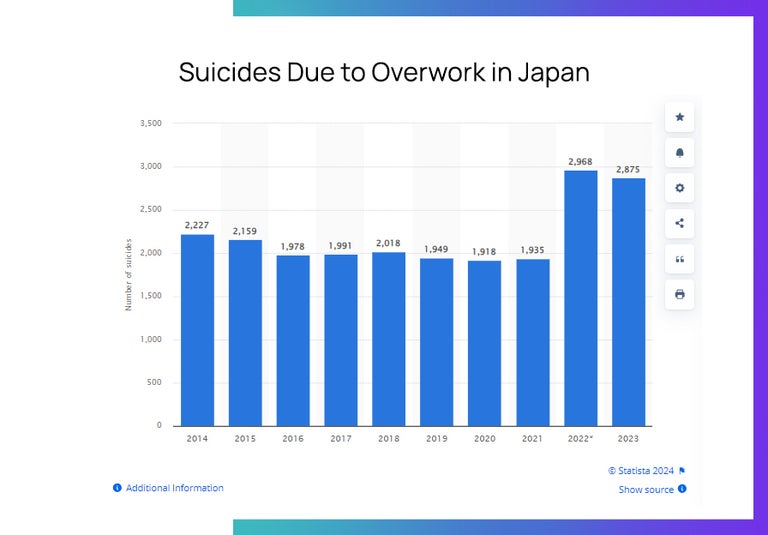
Shockingly, it doesn’t end there.
Karoshi Syndrome as it’s called, has gone global with 750,000 deaths in 2021.
Karoshi Syndrome is when employees experience sudden death due to extreme overwork – from heart attacks or strokes linked to stress and long working hours.
It showcases the deadly impact of workaholism, with cases driven by relentless pressure and not enough downtime. The kind you find most often, in offices.
When you are so busy that your health takes a backseat, you’re in trouble.
The great shift to remote work helped a lot of people realize this. We finally had a moment to sit back, relax and think about how difficult things had been at the office.
Here’s how to avoid it:
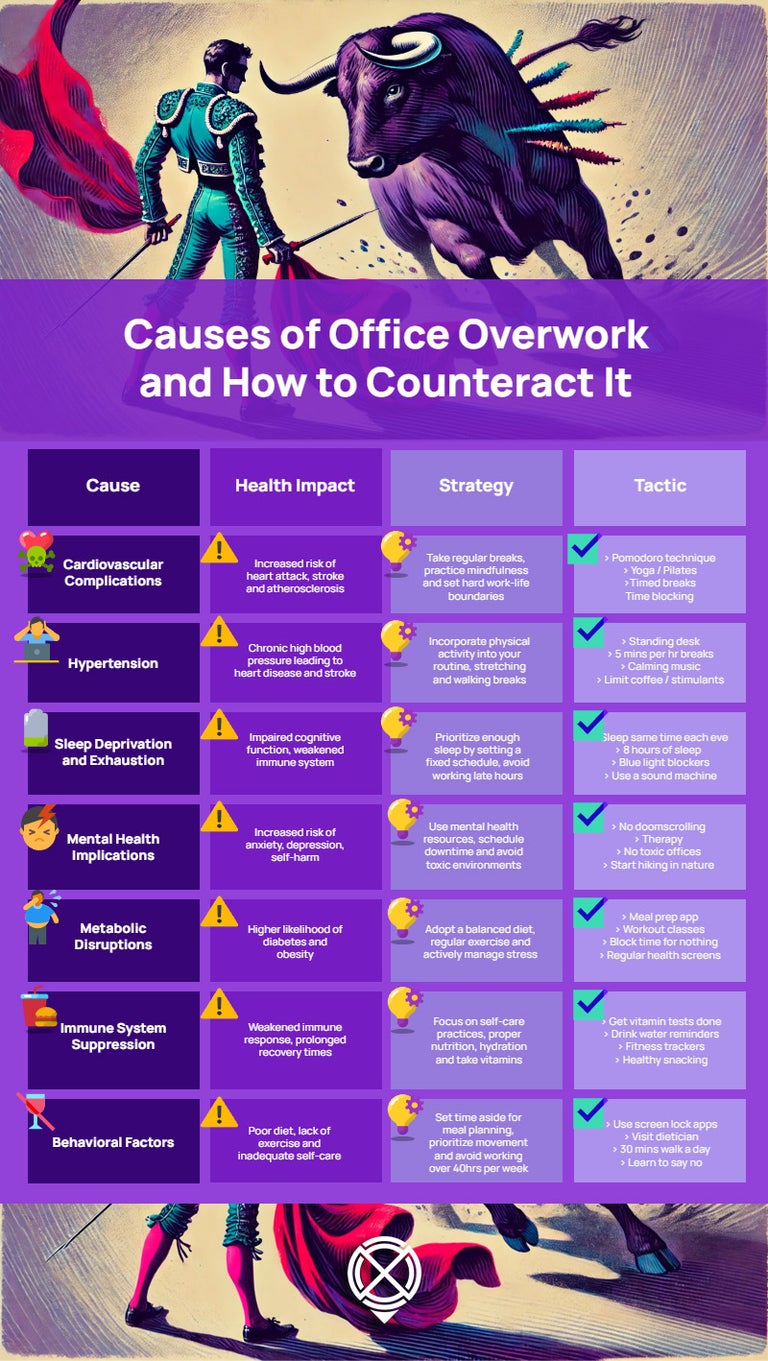
Your health isn’t for sale at any price. It’s the only true wealth you have in this life, and you should be investing in it every day – because it has the highest long-term returns.
Lesson 3: Never Work for Matador Managers
The office is LOUSY with self-interested managers.
A matador manager is an ambitious leader who uses flashy distractions and pressure to control their team, driving them toward burnout for the sake of performance, not progress.
You’ve seen them around, maybe even worked for one.
They offer you dreams of the future, perks that don’t amount to much and an insidious groundswell of pressure that – at any moment – you could be replaced. You’re plagued by anxiety and harassed by the constant lack of psychological safety.
Your manager (or superior) is a HUGE part of your job.

- 7 out of 10 people would quit because of a bad manager.
Poor communication, micromanagement and authoritarian-style leadership is on the menu at the office, where bullying is common.
- 30% of Americans are bullied at the office, often by leadership.
But the matador manager is subtle and covert. They are all about innovation and collaboration, while pushing a toxic culture of overwork.
They use the system to get ahead, pretending to be great leaders, while secretly stepping over the burning carcasses of burnt-out team members.
That’s why I call them Matadors.
Tech workers are like bulls in a bullfight. We charge horns-first at the red flags presented by the matador: endless hours, tight deadlines, unreasonable workload – you get it.
The matadors (company leaders) push them forward, all for the spectacle of productivity. But it's not about the bull's strength or endurance - it's about control. It’s about the crowd seeing the matador as the big wig.
As the bull charges again and again, burnout creeps in.
In the end, it's not glory or success waiting – it's TOTAL collapse.
In tech, workaholism is glorified, but the reality is bleak. It's workers burning out (and being used up) for the sake of a show that never ends, designed to further the ambitions of the matador at the expense of the bulls.
Because the show goes on. And there are always more bulls.
While great leaders inspire, bad leaders control. Never, ever work for leadership who are fine with bulls being sacrificed at the altar to please the crowd. They will never let you unplug, grow or enjoy your work.
They’re TOXIC af.
And as tech leader Nora Denzel says,
“Having a bad boss isn’t your fault. Staying with one is.”
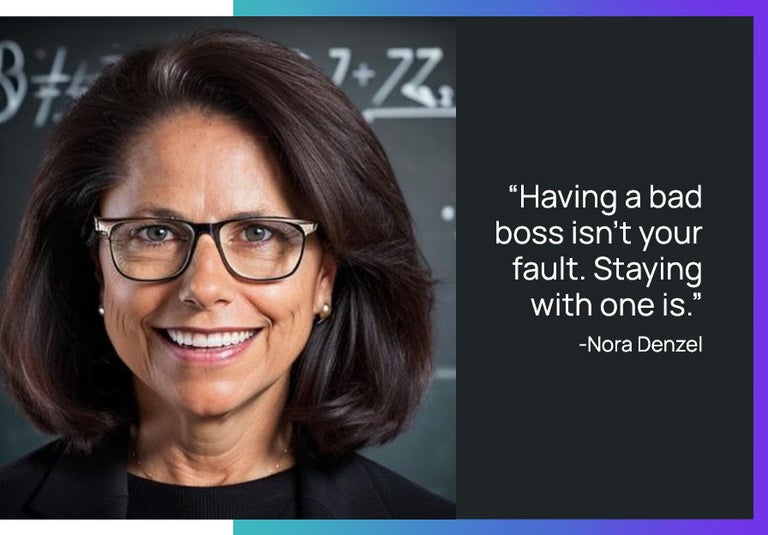
Look beyond your manager to the higher ups. Know where you work, how they operate, and what is expected of you at all times.
Alignment with leadership is alignment with your career.
Office-Only Policies: Designed for Social Control
Tech companies like Amazon are rolling out office-only mandates, and more companies could follow its lead. It's pretty clear that these policies aren't about collaboration or culture - they’re about control.
A total return to office mandate represents a reclamation of power, a push to reignite the old hustle culture, and an attempt to keep workers tethered to outdated systems.
It reminds me of cattle in a pen, but I’ve politely used bullfighting instead.
If you're not careful, you'll find yourself working longer hours, burning out in silence, and losing the freedom that remote work once promised you.
No matter what they say – you know remote work is better.
And you have a choice.
Avoid being locked in this prison by applying these three lessons:
- Face the Reality: The office is no haven for work-life balance. Remote work is the freedom you really deserve. Don’t be fooled by nostalgic claims that the office improves collaboration and connection. The data speaks for itself: remote workers are happier, healthier, and more productive.
- Your Health Is Not for Sale: Workaholism leads to burnout, and no job is worth sacrificing your well-being. Protect your health like your life depends on it - because it absolutely does. Your career is about roaming, not being penned in.
- Never Work for Matador Managers: Bad bosses thrive in office environments where they can micromanage and control. If your leadership sees you as a bull to be prodded and used up, it’s time to charge out of that ring. Look for leaders who value your growth, not just your grind.
The reality of these office-only policies is hectic: they’re designed to erode your autonomy and increase social control.
But you can fight back by choosing where you work, how you work and who you work for.
Take control of your career and protect your right to unplug.
A silent burnout epidemic is coming – avoid it to stay on track.








